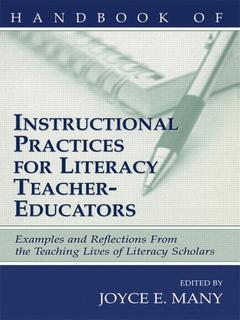Handbook of Instructional Practices for Literacy Teacher-educators Examples and Reflections From the Teaching Lives of Literacy Scholars
Coordonnateur : Many Joyce E.

This volume offers a unique glimpse into the teaching approaches and thinking of a wide range of well-known literacy researchers, and the lessons they have learned from their own teaching lives. The contributors teach in a variety of universities, programs, and settings. Each shares an approach he or she has used in a course, and introduces the syllabus for this course through personal reflections that give the reader a sense of the theories, prior experiences, and influential authors that have shaped their own thoughts and approaches. In addition to describing the nature of their students and the program in which the course is taught, many authors also share key issues with which they have grappled over the years while teaching their course; others discuss considerations that were relevant during the preparation of this particular syllabus or describe how it evolved in light of student input.
The book is organized by areas within literacy education: reading; English/language arts; literature; emergent literacy; content-area literacy; literacy assessment and instruction; literacy and technology; and inquiries into literacy, theory, and classroom practice. It is accompanied by an interactive Web site: http://msit.gsu.edu/handbook. This online resource provides additional information about the authors' courses including complete syllabi, recommended readings, grading rubrics, and sample assignments. Readers are invited to respond and contribute their own syllabi and teaching experiences to the discourse generated by the volume.
Date de parution : 02-2001
15.2x22.9 cm
Date de parution : 07-2016
15.2x22.9 cm
Thème de Handbook of Instructional Practices for Literacy... :
Mots-clés :
preservice; Donna L; Wiseman; Susan L; Pasquarelli; Rachel L; McCormack; Sally M; Oran; Kathleen Bennett deMarrais; Jamie B; Lewis; Victoria Purcell-Gates; Taffy E; Raphael; Jane West; Donna Cooner; JoBeth Allen; Nancy Farnan; Peter Smagorinsky; Peggy Albers; David Schaafsma; Kathy G; Short; Cheri Anderson; Lee Galda; Patricia E; Enciso; Violet J; Harriss; Robert E; Probst; Lesley Mandel Morrow; Mona W; Matthews; David B; Yaden; Camille Cubillas; Carol V; Lloyd; Victoria Gentry Ridgeway; Thomas W; Bean; Penny A; Freppon; Steven A; Stahl; Robert J; Tierney; Lora Lawson; Elizabeth Murray; Jim Hoffman; Rachel Salas; Beth Patterson; James Marshall; Michael W; Smith; Ruth A; Hough; Linda D; Labbo; David R; Reinking; David Reinking; Leslie Patterson; Christine H; Leland; Jerome C; Harste; James V; Hoffman; Richard E; Ferdig; P.David Pearson; Michigan State University; National Reading Research Center; Rudine Sims Bishop; National Reading Conference Yearbook; Reading Miscue Inventory; Family Literacy Programs; God’s Wife; Itinerant Teachers; Kitchen God’s Wife; APA Style; Molly Bang; Content Area Literacy; Book Club Connection; Literature Circle Discussion; Multicultural Children’s Literature; ERD; National Reading Conference; MS DOS; Navajo Nation; Preservice Teachers; Effective Literacy Programs; Language Arts Methods; Dynamic Assessment; Classroom Assessment System; Eric Document Reproduction Service



